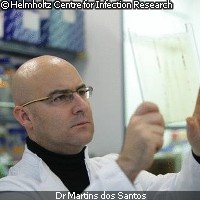Nov 5 2008
EU-funded scientists in Germany and the US have gained insight into bacterial metabolism that greatly advances our understanding of how these microbes may be used in the production of biosynthetics. The researchers used computer models to calculate the genetic changes necessary to make the Pseudomonas putida bacterium increase its production of natural synthetics, and laboratory experiments validated their findings. The results, which have implications for medical biotechnology, have been published in the journal PLOS Computational Biology.

The study was funded under the EU's Sixth Framework Programme as part of the Marine Genomics and PROBACTYS projects.
According to the study, 'A cornerstone of biotechnology is the use of microorganisms for the efficient production of chemicals and the elimination of harmful waste.' P. putida has a flexible metabolism that allows it to live in any number of habitats; it also produces chemicals and pharmaceutical products and degrades waste and toxins. P. putida was used in the current study because of its 'metabolic versatility, stress resistance, amenability to genetic modifications, and vast potential for environmental and industrial applications'.
Strains of P. putida are used in the production of a range of chemicals and other processes. However, most Pseudomonas-based applications are still in infancy because the relationships between their genotypes (internally coded, inheritable information) and phenotypes (physical manifestations of this information) are not adequately understood.
'When sequencing the genome of an organism, you frequently do not know what the individual genes mean and how their interaction functions,' explained Dr Martins dos Santos of the Helmholtz Centre for Infection Research (HCIR) in Germany.
Mr Jacek Puchalka of the HCIR and colleagues developed a large-scale mathematical model of the metabolism of P. putida in order to better understand its growth and metabolism. Their model represented a network of individual genes and known metabolic processes in the bacteria.
'All of this is similar to a map with cities and motorways,' explained Mr Puchalka. 'On some roads, there is a great deal of traffic, while others are very quiet. Some roads are blocked and then there are detours. The metabolic paths in P. putida behave in exactly the same way.'
The scientists then validated their model using data from carbon tracking and other laboratory experiments, and expanded it to identify key features of the microbe's metabolism.
The model proved robust enough to predict the outcome of introducing changes to P. putida. Because bacteria are able to divert their metabolic paths when these paths are disrupted by mutations, the researchers used the model to see what would happen when they changed specific metabolic pathways in P. putida.
The model was used to devise metabolic engineering strategies to improve production of polyhydroxyalkanoates, a class of biotechnologically useful compounds. Specifically, they sought to increase the yield of PHB (polyhydroxy butanoic acid), an important synthetic whose production is at present long, drawn-out and comparatively costly.
They were able to use the model successfully to determine which paths need to be changed in P. putida in order to increase its production of PHB.
The study concludes, 'The solidly validated model yields valuable insights into genotype-phenotype relationships and provides a sound framework to explore this versatile bacterium and to capitalise on its vast biotechnological potential.'
'In future, it will be possible to manufacture biosynthetics more efficiently in large quantities,' said Mr Puchalka. 'And if we have made our contribution to this, we are very pleased.'